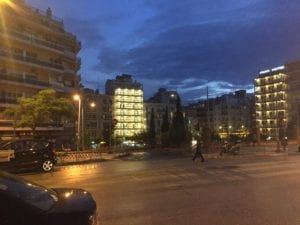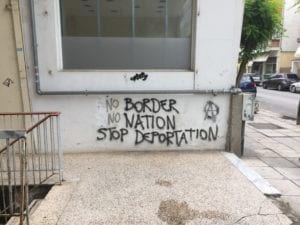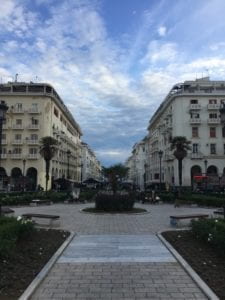Michael Leonetti
Elpída Home for Refugees
Thessaloniki, Greece
Hi! Thanks for coming back for part two of this blog. Today was my first full day in Thessaloniki, and I tried to cover as much ground as possible on foot to get familiar with the city. Some photos of what I found are at the bottom.
I’m writing this in a small vegan restaurant (e.g., soy “beef” gyros) on Balanou Street. Before my first day at Elpída, I’d like to try to answer two fundamental questions that come up in conversations about refugee issues:
- What makes someone a refugee?
- What rights do refugees have?
First, a refugee is someone who is forced to leave her country of origin and who is unable to return due to a well-founded fear of persecution or other harm to life and liberty. This persecution is inflicted on a person as a consequence of one or more of the following: religion, nationality, race, political opinion, or particular social group. As mentioned, a person must be outside of her country of origin to be considered a refugee; if she is displaced but remains within her nation, she is referred to as an internally displaced person or IDP.
One point about the “refugee” label is especially important to remember: refugee status is declaratory, not determinative; giving someone the label of “refugee” does not make her a refugee but rather recognizes that she is one and has been from the moment she crossed her nation’s border regardless of documentation or asylum status.
To answer the second question, I’ll break down the rights of refugees into three categories: the relevant rights of all persons, the rights of asylum seekers during migration, and the rights of refugees when settled in a host country.
First, the International Bill of Human Rights (collective name for the Universal Declaration of 1948, the International Covenant on Economic, Social, and Cultural Rights of 1966, and the International Covenant on Civil and Political Rights of 1966) grants all of us several human rights related to nationality and migration. We have the rights to leave our country and seek asylum elsewhere, to have a nationality, and to not be arbitrarily deported by one’s own nation or a host. These basic rights are complemented by international refugee law.
The second and third categories of rights come mostly from the 1951 Refugee Covenant and its 1977 Protocol. Most of the rights of asylum seekers during migration are more accurately described as restrictions on governments. For example, governments cannot send a person back to their country of origin before processing their claim to asylum. This “refoulment” is prohibited, as is sending a person to a third party country that can be expected to send them back to their country of origin. A recent example of refoulment is the effort by EU and Libyan coast guards to apprehend and push back migrant boats at sea. In sum, people have a right to apply for asylum (e.g., refugee status) and have that application processed.
Finally, refugees have extensive rights in the host country. The 1951 Convention grants property rights; economic, social, and cultural rights; and rights concerning access to social security, welfare, and education. Refugees also are protected from torture and other government cruelty. Simply put, refugees enjoy the same rights as citizens of the host country and are obligated to follow the local laws. Host governments hold primarily responsibility for making sure that refugees in their territory enjoy their human rights. This means taking steps to help refugees overcome barriers such as financial instability, language and illiteracy, lack of transportation, and so on.
Since this is a short blog post, these are simple answers. Find more perspectives and an article about shipwrecks (and who’s responsible) here:
http://www.ijrcenter.org/refugee-law/
Being familiar with these rights is important not only because the world refugee population is on the rise, but also because nations continue to take steps to shirk their responsibilities. Recently, there have been moves around the EU to classify refugees as “economic migrants” and “irregular immigrants,” two labels that deliberately omit the word “refugee.” If people are labeled as such, they would not have the protections to which refugees are entitled. The motivations behind this are understandable. The responsibilities that a refugee crisis places on host countries create a considerable and unevenly distributed burden, but it is nothing compared to the weight of inaction during a humanitarian crisis.
Thanks for reading! I look forward to writing more after I get started at Elpída. 

